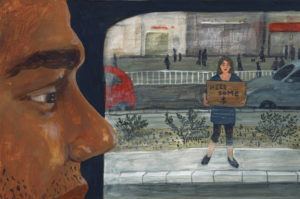Disability
***It’s possible in many US states to obtain a driver’s license when you are hearing impaired.

Today my Lyft driver was deaf and mute.
Immediately, I wondered, how were we going to communicate? But then, as the ride progressed, we “talked” with eyes, expressions and gestures. Everything was magnified.
It got me thinking: Do people treat immigrants like disabled people sometimes? Because we have accents and not the same bank of cultural knowledge— “What! You don’t even know what Sesame Street is??” Every time I meet an “American,” I see it in their eyes.
I’ve seen foreigners in airports get yelled at when they simply don’t understand or speak the language well. (Clearly, a raised, angry voice results in immediate comprehension.)
My mother was concerned when I told her about this ride. “Why is he driving when he can’t hear?”
But, as I researched, accident rates of hearing-impaired drivers are as high as “normal” people. He could type, he could navigate, and he paid special attention to the roads. He did everything he could to ease my anxiety at his disability.
Had there been passengers canceling their rides after they discovered his disability?
Probably.
But to me, he was one of my best drivers, and he made me feel welcome and safe.
Before he turned off the main road, a young woman was standing at the green belt, holding a piece of cardboard and asking for money. She was dressed fashionably, and had makeup on. I knew nothing about her circumstances, but it was an incongruous picture.
I turned to my driver and said, gesturing, ” You cannot hear (ears) and talk (mouth) but you are driving (steering, thumb up) Perhaps you could teach her how you do it.” My driver “interrupted” me immediately with an expressive “I completely agree!” We lipped each other “thank you” at the end of this trip. I felt it wasn’t enough to express my admiration, so I initiated a high-five and we gave each other a hug.
There’s a saying from my culture, and perhaps it should be universal: “The blind sing most beautifully, the crippled have the strongest arms, the heavily accented and tongue-tied are innately more eloquent,” and I add, “the mute and deaf give the best hugs.”
By Runfang Zhang
About the artist

Alexandra Burda is from Romania and currently lives in Helsinki, Finland. She loves traveling, people, animals, history, emotions and the wonderful world of imagination. If she were not an artist, she would like to work as a scientist, or a professional athlete. Some of her portfolio can be found at
http://alexandraburda-illustration.com/
